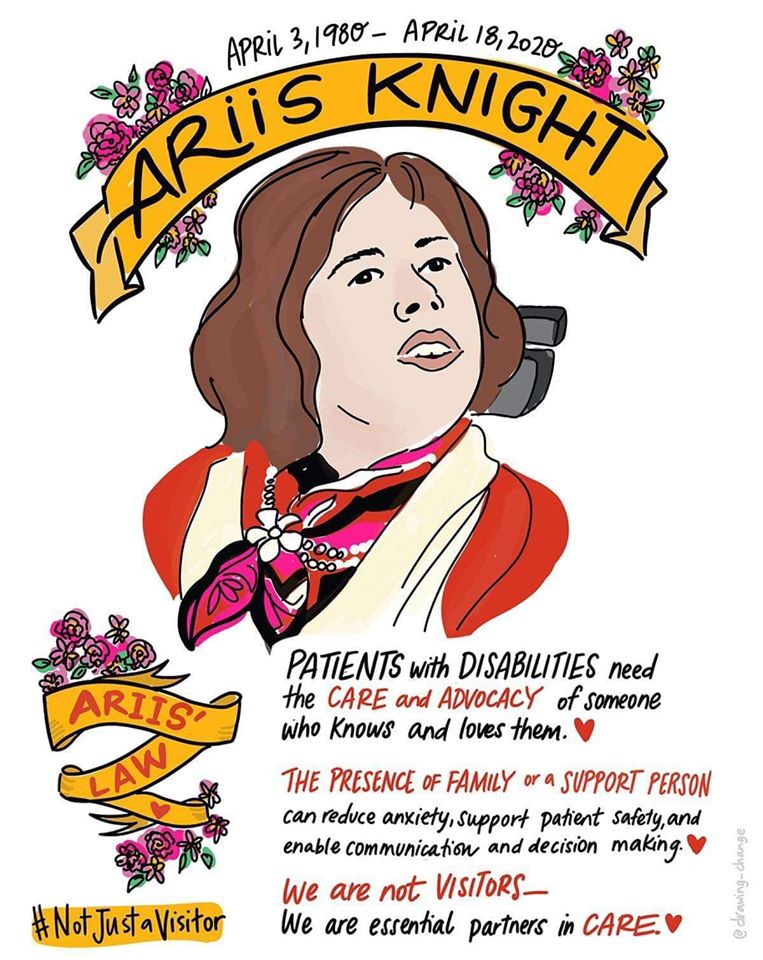|
[Image description: Illustration portrait of Ariis Knight, a person in a wheelchair looking up with medium length brown hair and wearing a scarf and a flower necklace. Yellow banner surrounded by flowers above reads: "Ariis Knight April 3, 1980 - April 18, 2020" Yellow banner below reads "Ariis' Law" Text: "Patients with disabilities need the care and advocacy of someone who knows and loves them. <3 (heart) The presence of family or a support person can reduce anxiety, support patient safety, and enable communication and decision making. <3 (heart) We are not visitors-- We are essential partners in care <3 (heart) @drawing.change #NotJustAVisitor"] Image Credit: Drawing Change Her name was Ariis Knight. She was 40 years old. She communicated through her eyes and facial expressions; she had a beautiful smile. She was described to have a "bold sense of fashion" and a "huge personality". She died alone in the hospital without access to support staff or family. A non-speaking B.C. woman with cerebral palsy who "defied limitations", Ariis was admitted to Peace Arch Hospital on April 15th and died days later. Because of unclear COVID-19 restrictions, the hospital denied access to support staff and family who would have supported her communication and decision-making at the end of her life. We know in the disability community that if there isn't someone to be with a disabled person at the hospital, to say these are the supports this person needs, to say we are watching if medical neglect happens (and it does), they can die. While we do not know if the lack of communication and support directly resulted in her death, it could have played a role and certainly impacted the quality of her care and carrying out her end-of-life wishes. The unjust circumstances around her death were entirely preventable. Allowing support people and family to aid a disabled person at hospital visits is essential, not exceptional. It is also the responsibility of the hospital to ensure disabled people have access to communication supports, whether that be AAC (augmentative and alternative communication) or a support person. It in Ariis's case, she died without anyone who cared for her around her. This is not simply a tragedy; it is an injustice that was created by ableism and systemic failures to ensure disabled people are protected during the pandemic. Her story isn't unique. We are hearing across the country that disabled patients in hospitals are being denied access to supports, when policies are unclear and implementation is inconsistent in designating support staff and families as essential. Self-determination, supported decision-making, and communication access are human rights that cannot be denied during a pandemic. Disabled advocates have been flagging this as an issue for weeks. We call on the federal and provincial governments to act urgently to put a stop to these unjust deaths. We urge governments to: 1. Create unified policy across Canada with clear, unambiguous language deeming support staff and family as essential to accompany disabled people needing supports for communication, decision-making and specialized care in hospital visits. 2. Mandate access to alternative and augmentative communication (such as the patient's own AAC device, a sign language interpreter, or a support person who understands their communication style) in all hospitals and clinics. 3. Implement these policies comprehensively at the provincial and territorial level with training and orientation of hospital staff. 4. Strengthen and streamline existing complaints processes through patient quality care offices, so that accessibility barriers can be addressed in a timely manner. 5. Support hospitals in making plain-language materials to help disabled patients understand their situation and options. These changes need to happen now. But they won't help Ariis, who has passed on and left behind loved ones to mourn her and remember her. As a community, we grieve for the tragic loss of a fellow disabled person's life. We remember you, Ariis. Rest in power. ---- Share our five calls to action with your MP and provincial/territorial representatives to demand for change in Ariis's memory. You can look up contact information for your federal representative / MP on the Parliament website. Use the links below to find contact information for your provincial/territorial representatives:
0 Comments
Your comment will be posted after it is approved.
Leave a Reply. |
